Ed. note: Dean of Faculty Peter Valine presented four instructorships during Convocation on September 16. Here is the text of his remarks:
The Henry M. Zachs and Judith Zachs Faculty Chair was established in 1999 by Henry M. Zach, Class of 1952 and Judith Zachs.
The Zach’s Chair recipient is starting her 16th year at Williston and during this time she has made a significant contribution to the academic life of the school. Perhaps the most important of these many contributions has been her innovative and energetic efforts to advance the craft of writing in our school community. Her commitment to the goal of developing Williston students as effective writers has been forwarded along three fronts: the classroom, her leadership of Janus, and the creation of the Williston Writing Center.
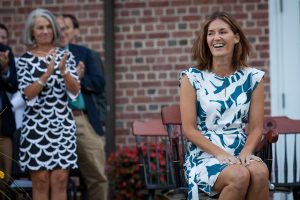
In the classroom she understands that relationship building is the first step to creating the atmosphere of trust between a teacher and her students. Her enjoyment of teenagers is evident—she loves their sophomoric nature and she possesses the knack to get them to open their hearts and souls in both conversation and prose. She has discovered the secret of how to get her students to recognize the importance and seriousness of their study while not stifling the pure, unbridled joy of reading and learning with others. Her student feedback often references the richness of her class discussions as the key to unlocking the deeper meanings of a piece of literature. In this regard the students praise her ability to ask just the right probing questions that challenge them to reassess their understandings and to appreciate other perspectives. When asked on the student feedback form what are the three words that best describe this class, one of her students wrote: Makes Me Think.
The Zach’s Chair recipient also served for many years as the faculty advisor to Janus Williston’s literary magazine. In this role she has encouraged our students to submit and share their written and artistic expressions. She has recruited these writers and artists to be risk-takers and to air their work in public as a way gaining feedback and of building confidence and a sense of pride in their work. This past summer she had an opportunity to hone her own craft when she was invited to join a session at an Arkansas Writer’s Colony.
Perhaps her most visible role on campus is serving as the Director of Williston’s Writing Center which opened in 2005. From its inception she has effectively designed, staffed, and marketed this academic resource and it has become an integral part of the support services that Williston offers its students. The opportunity to learn from one-on-one instruction for enhancing basic writing skills has filled a significant need for students as judged by the number of visits that seem to be exponentially increasing each year. A recent Williston graduate recently mentioned in a school blog that she got in the habit of using the writing center at Williston and that habit assisted a smooth transition to utilizing the Writing Center at her college which has been a boon to her studies.
This year we are eager to watch her apply her energy, creativity, and collegiality in her new role as English Department Head.
I am pleased to announce that the Henry and Judith Zachs Faculty Chair is awarded to Sarah Sawyer.
The Prigmore Faculty Chair is given by G. Daniel Prigmore, Class of 1961 and Kristin J. Prigmore, Class of 1988 in memory of his parents and her grandparents William H. Prigmore and Dr. Mildred J. Hausmann. This Chair is to be given to a member of the History Department selected by the Head of School who is considered most able to teach history with a perspective that encourages students to seek out all the contributors leading up to the events history has recorded.
The new recipient of the Prigmore Chair joined the Williston faculty in 2012 and has quickly become a stalwart in the History and Global Studies department. His dedication to the art of teaching is evident in his careful and deliberate lesson planning, his thoughtful and strongly held beliefs on how students learn best, and his rich collaboration with colleagues in the department.
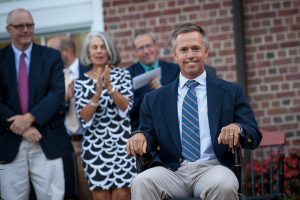
His effectiveness as a teacher starts with his clearly articulated expectations of his students. He takes the time to explain his rationale for class protocols and he invites the students to partner with him in the exploration of historical themes and events. He is extremely well organized as he presents his students with an agenda with learning goals for each day and he excels in keeping his eyes on the prize and staying true to his priorities.
His students enjoy their experiences in his classroom for several reasons. First, his passion for the subject is unquestioned. He is an avid reader, and he continues to push himself as an historian by frequently participating in professional development opportunities. This summer, for example, he traveled to Texas after his acceptance into a selective program for history teachers hosted by the Gilder Lehrman Institute of American History. He clearly has a hungry heart for history. Second, he devotes the necessary time to support his students. He possesses the discipline to provide timely and substantive feedback on formative assessments which guide students toward richer understandings. His students know that he is always willing to help. “He never turns you down,” one student recently wrote.
Like most successful teachers he varies his teaching methods. While he does use lectures to introduce new material, he enlivens the class through the use of video clips, historical songs, and group discussions. His students quickly become more adept at analyzing primary source documents and contextualizing historical movements and events. They appreciate his openness to their questions and his acceptance of new interpretations. One of the favorite activities of his students is the debate format. They note that he always challenges our understandings by making us explain our points.
I think a student summed up the case for the Prigmore Chair selection best when he or she wrote on the feedback survey last spring that “Mr. Doubleday is one of the teachers who is most invested in our education and who really wants us to learn.”
I am happy to announce that The Prigmore Faculty Chair is awarded to Michael Doubleday.
The David H. ’35 and Edward J. Goodman ’37 Science Chair was established in 2001 by a bequest of David Goodman to honor a member of the Science Department.
The Goodman Science Chair recipient joined the Williston faculty in 2011 bringing with him a wealth of boarding school experience in all areas of school life. He is being recognized not only as a master teacher, but as an academic leader who has both supported his colleagues and facilitated a significant curricular reform in the Science Department.
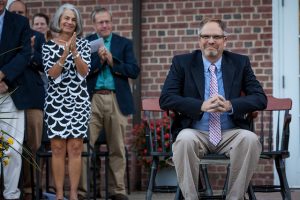
In the classroom he is a dynamic instructor who delivers even the most complex concepts in advanced Chemistry in a clear and concise manner. His complete mastery of the material allows him to devote much of his time to experimenting with the best teaching methods to promote student learning. Though his students often struggle as they wrestle with the advanced concepts, they appreciate his ever supportive and encouraging attitude. While he provides frequent extra help sessions and is patient and thorough in answering their questions, he believes that learning is deepest when it springs from the student. By empowering his students to embrace the learning process and to develop their critical thinking through problem-solving exercises-he teaches them the values of perseverance and resilience. His students also gain reinforcement from his well-constructed labs that complement their study and bring the chemistry concepts to life.
The last five years have been incredibly busy years as he has led the Science Department through a curriculum review, contributed to the emergence of Williston’s Strategic Plan, assisted with the Science Department segment of the NEASC Reaccreditation process, and provided important input for the design and construction of the new science building. The curriculum review process led to a complete revision of the science curriculum with the adoption of a Physics First philosophy in the Upper School science program. He also shepherded the launch of the Williston Scholars Science program and used his networks at the Five Colleges to connect our budding scientists with experts in the field of their research.
Finally, and perhaps most importantly he has served as a passionate role model for our students and a dedicated mentor to the members of the Science Department over the past five years.
I am pleased to announce that the Goodman Science Chair is awarded to Bill Berghoff.


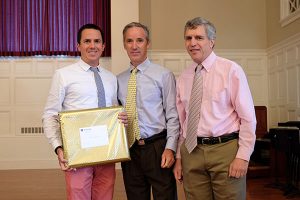
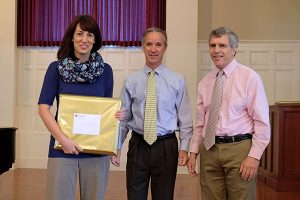
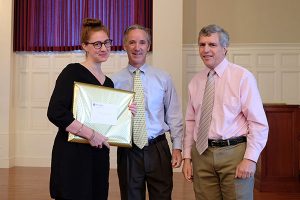
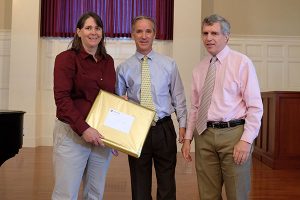
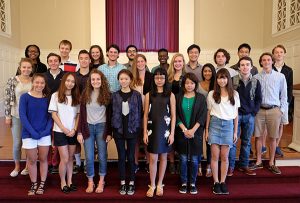 Last October, about 1.6 million juniors in more than 22,000 high schools took the 2015 PSAT test, which served as the initial screening for the National Merit Scholarship program. The nationwide pool of National Merit Semifinalists represents less than one percent of U.S. high school seniors and includes the highest scoring entrants in each state.
Last October, about 1.6 million juniors in more than 22,000 high schools took the 2015 PSAT test, which served as the initial screening for the National Merit Scholarship program. The nationwide pool of National Merit Semifinalists represents less than one percent of U.S. high school seniors and includes the highest scoring entrants in each state.